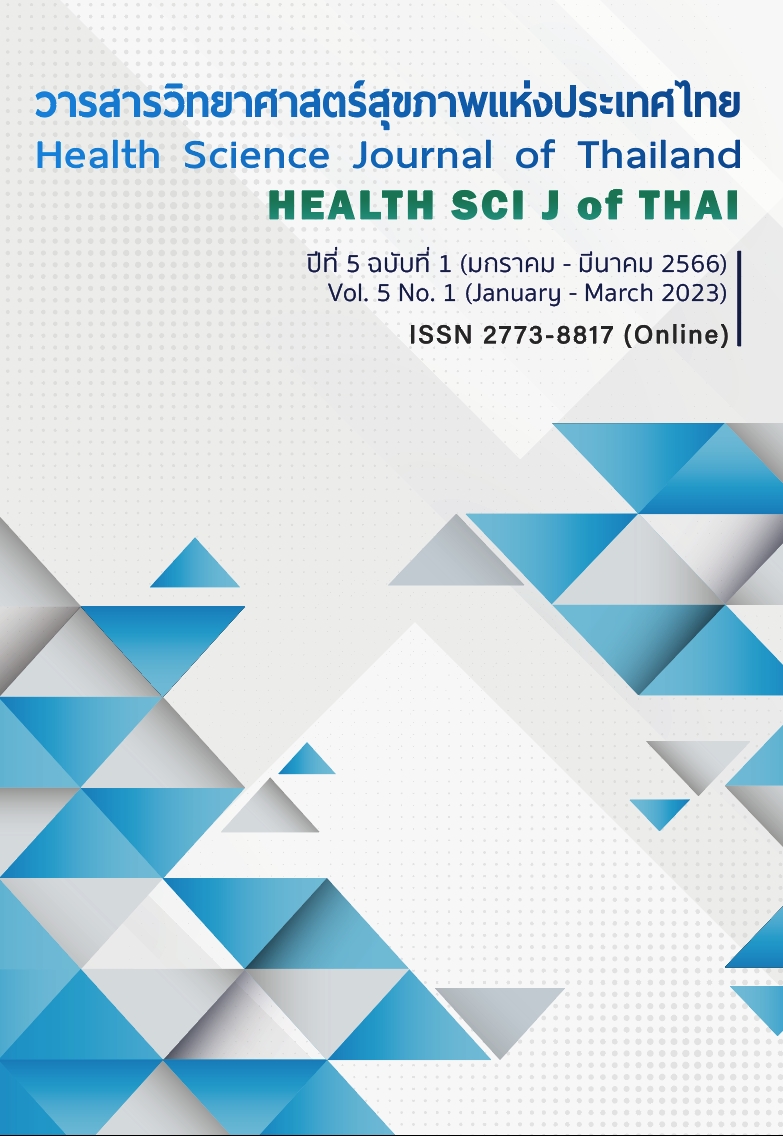Effectiveness of Cannabis-containing Tea on Insomnia
Main Article Content
Abstract
Cannabis is used as a medical herb, for which purpose of public health. Quasi-experimental Research aims to study the effectiveness of drinking cannabis-containing tea against insomnia in people of Sakon Nakhon Province. The inclusion criteria of the sample are aged 20-29, insomnia, sleeplessness, being awake in the middle of the night, or difficulty sleeping for more than 20 minutes and then falling asleep regularly in the last 1 month. The Thirty volunteers were given cannabis-containing tea of 3 %w/w (group 1), 5 %w/w (group 2), and 7 %w/w (group 3), which collect data with the Pittsburgh Sleep Quality Questionnaire. The statistics for data analysis used Wilcoxon Signed Ranks Test and Kruskal Wallis H Test. The result shown comparing sleep quality during pre-trials was statistically no different (p<0.05). After the trial presented statistically significant differences (p<0.05), which was after drinking cannabis-containing tea 30 minutes before going to bed for a week. The sleep quality before and after the trial in group 1 was compared, which is no statistically significant difference (p<0.05). The comparison of sleep quality before and after the trial between group 2 and 3, show a statistically significant difference (p<0.05). The results show that drinking 5%w/w and 7%w/w of cannabis-containing tea improves sleep quality, this is a healthcare option for insomnia people.
Article Details

This work is licensed under a Creative Commons Attribution-NonCommercial-NoDerivatives 4.0 International License.
References
Leelarasamee A, Srisubat A, Srisuko C, Wongsirisuwan M. Guidance on cannabis for medical use, Editor, Nonthaburi: The Medical Council of Thailand, 2019. (in Thai).
Oliviero B, Luigi FS, Elena G, Paolo P. Herbal remedies and their possible effect on the GABAergic system and sleep. Nutrients 2021; 13(2): 1-13.
Rajanukul Institute. Department of Mental Health suggested 10 tricks to help you sleep well [Internet]. 2018 [cited 2022 Mar 31]. Available from: https://th.rajanukul.go.th/preview- 3110.html. (In Thai).
Department of Mental Health. Insomnia is associated with a life clock solved without medication. [Internet]. 2020 [cited 2022 Mar 31]. Available from: https://www.dmh.go.th/news-dmh/view.asp?id=30519. (In Thai).
Rodriguez JC, Dzierzewski JM, Alessi CA. Sleep Problem in the Elderly. Med Clin North Am 2015; 99(2): 431-439.
Tengtermwong N. Effectiveness and safety of Suk Sai-Yad Herbal remedy for chronic insomnia: A preliminary retrospective study in Chao Phya Abhaibhubejhr Hospital. J Thai Trad Alt Med 2021; 19(2): 331-43. (In Thai).
Tipratchadaporn S. Assessment of the benefits and safety of using thai medicine eyes to enter cannabis at Hangkrarak clinic Phra Ajan Phan Ajaro Hospita: Case Study of Suksayasayat Recipes [Internet]. 2022 [cited 2022 Mar 31]. Available from: http://www.
arjarohospital.go.th/index.php?option=com_attachments&task =download&id=434. (In Thai).
Kongme Y. Effectiveness of Shed-Heak and cold herbs mask treatment for reducing headache pain among patients with migraine at healthcare network Pabon District, Phatthalung Province. Health Sci J Thai 2021; 3(2): 39-47 (In Thai).
Tongkasee P, Srithat D, Jitcharerntham A, Piwngern T. The Formulation of Product Prototype Based on Cannabis Additive: RMUTI-SKC. Sakon Nakhon: Rajamanggala University of Teachnology Isan Sakonnakhon Campus; 2022. (In Thai).
Karnchanakomate J, Wongsawat P. Sleep quality and relate factors among university students. Journal of Nursing Science & Health 2020; 43(2), 135-45. (In Thai).
Akksilp S. Guidance on cannabis for medical use. Nonthaburi: Department of Medical Services; 2019. (In Thai).
Sooksawate T, Chantraket R. Club of Journal. Thai Trad Alt Med 2016; 14(2): 217-20. (In Thai).
Ploysawang P, Imsamran W, Sangrajrang S. marijuana: Medical benefits and toxicology. Thai Trad Alt Med 2016; 14(2): 217-20. (In Thai).
Chunvijitra W. Planting of mint. Kasetsart Extension Journal 2015; 60(2): 75-82 (In Thai)
Paitoonyakul S. Perception and attitude of consumers towards Stevia Powder in Bangkok [Master of Science]. Bangkok: Kasetsart University; 2019. (In Thai).
Bhagavan C, Kung S, Doppen M, John M, Vakalalabure I, Oldfield K, Braithwaite I, Newton-Howes G. Cannabinoids in the treatment of insomnia disorder: a systematic review and meta-analysis. CNS drugs. 2020; 34(12): 1217-1228.
Chan S, Blake A, Wolt A, Wan BA, Zaki P, Zhang L, et al. Medical cannabis use for patients with post-traumatic stress disorder (PTSD). J Pain Manage 2017; 10(4): 385-396.
Department of Thai Traditional and Alternative Medicine. Nuad Thai & Thai Herbs towards Good Health for All. [internet]. 2020 [Cited in 12 July, 2022]. Available from: https://www.dtam.moph.go.th/E-Book/academic-meeting-172563/index.html#p=4.
Solimin R, Rotolo M, Pichini S, Pacifici R. Neurological disorders in medical use of Cannabis: An Update. CNS Neurol Disord Drug Targets 2017; 16(5): 527-533.
Thanapon N. Toxicology of cannabis. Thai J Hosp Pharm 2020; 30(2): 125-136.
Somsak A. Guidance on Cannabis for Medical Use. Nonthaburi. Department of medical services; 2019. (In Thai).


